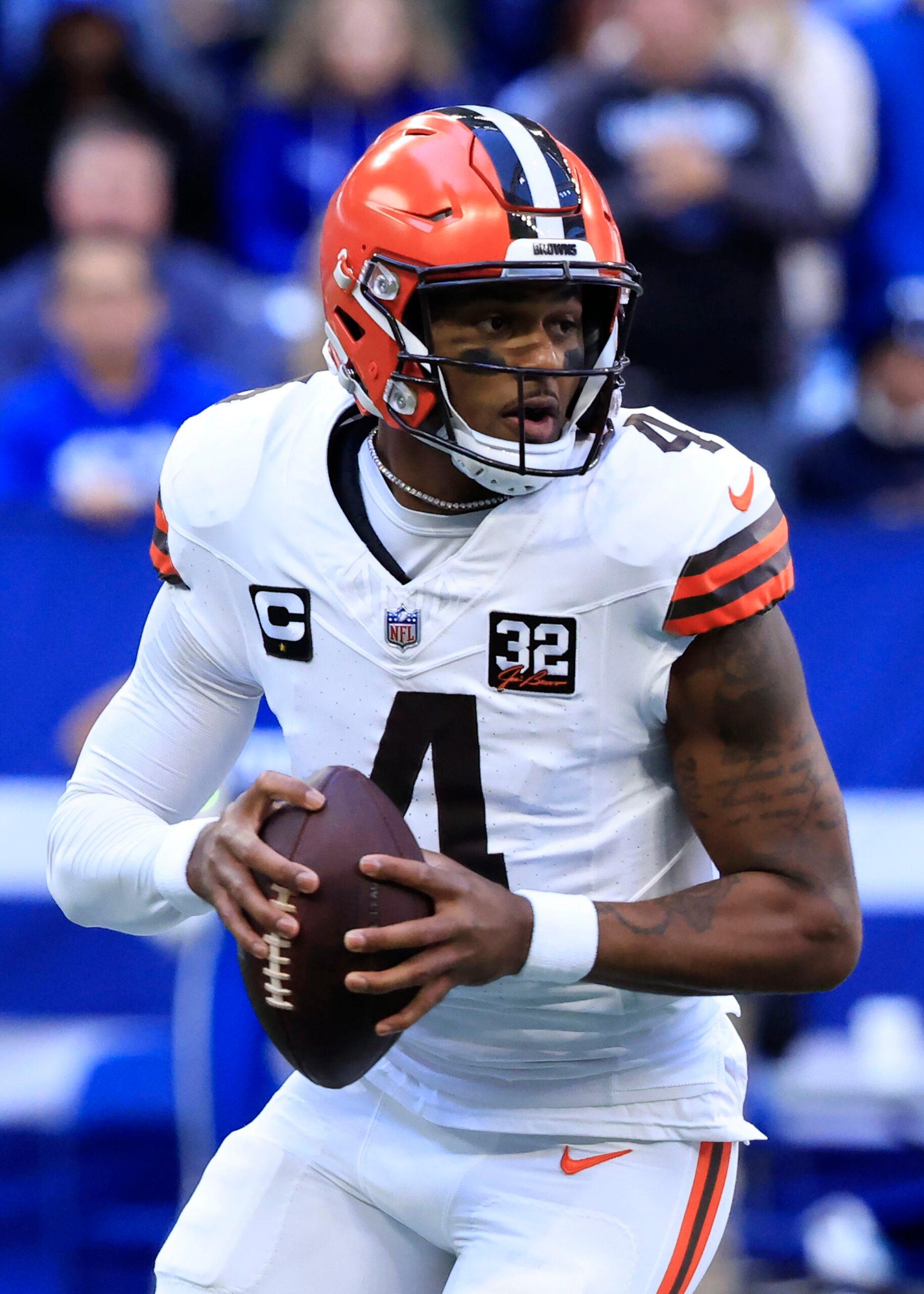You would be forgiven, having watched the Cleveland Browns move to 4-2 after a highly entertaining game featuring eight lead changes against the Colts last week, for getting swept up in what’s happening on the field rather than the sideshow off it pertaining to quarterback Deshaun Watson’s health and availability. But off-field issues—to use that handy euphemism, verbal sandpaper for the rough edges of whatever the NFL would rather you or I not think about when it comes to Watson—seem to be bubbling up in Cleveland, where an otherwise promising team is sagging under the weight of the most complicated player-team dynamic in the league.
First, the facts: On Sunday, Watson left the game in the first quarter after taking a hit from Colts defensive end Dayo Odeyingbo. Watson was evaluated by the independent neurologist on-site and cleared concussion protocol, which meant he was allowed to reenter the game. But Browns head coach Kevin Stefanski elected to keep Watson on the sidelines in favor of backup PJ Walker, who eventually led a game-winning scoring drive to complete a comeback and give the Browns their second straight win. Watson was never given an official injury designation, as is typical for players who leave a game and don’t return.
“I just did not want to put him back out there,” Stefanski said after the game. “I wanted to protect our franchise quarterback. That was my decision.”
Stefanski didn’t say exactly what he was trying to avoid by keeping Watson out, whether it was a potential head injury, aggravation of the right shoulder rotator cuff strain the quarterback is dealing with, both, or something else entirely. Watson, in his own postgame press conference, said it wasn’t his decision not to go back in. The quarterback was otherwise short on information: He said he wasn’t sure whether he’d have an MRI, or whether thought he’d reinjured his throwing shoulder, or whether he’d be able to start the next game against the Seahawks.
“They felt like the decision was best to let PJ go in and finish the game,” Watson said.
Then on Monday, Stefanski said that the Browns were still “gathering information” about Watson’s shoulder. He called Watson “our starter moving forward” and said Watson would play Sunday against the Seahawks—as long as “he’s ready to roll.” Stefanski used the phrase “day-to-day” quite liberally, but did not have an answer when asked whether the Browns would consider putting Watson on injured reserve, which would mean he’d miss at least the next four games. On Tuesday, ESPN and NFL Network reported that a new MRI revealed a strained muscle in the rotator cuff, an injury that could take four to six weeks to heal.
That’s a season’s worth of injury drama in just the past week. Let’s look one level out at the broader picture, which reveals vagaries and contradictions about Watson’s health that have been trickling out of Cleveland for weeks.
Watson first injured his rotator cuff on September 24 against the Titans. He didn’t practice the following week, but told Cleveland.com the Thursday before the Browns’ Week 4 division game against the Ravens that he expected to play. That Sunday morning, NFL Network reported that Watson would be inactive.
The Browns, with rookie fifth-round pick Dorian Thompson-Robinson at quarterback, lost 28-3. The Athletic’s Jason Lloyd reported that some players were “kind of aggravated” that Watson sat out. The next day, Stefanski said the quarterback had been medically cleared to play but made the decision not to, a comment that felt pointed, regardless of intent. The NFL’s play-at-all-costs mindset isn’t something to valorize—and applying the metric tonnage of painkillers NFL players use to get through the day isn’t simple when you’re talking about a quarterback’s throwing shoulder—but there’s usually very little daylight between a player being medically cleared and him playing, especially in a meaningful game against a division rival. Just look elsewhere on the Browns roster—tight end David Njoku is playing with extreme burns on his face right now.
“It wasn’t a matter of pain tolerance or anything,” Stefanski said after the Ravens game on October 1. “[Watson] just did not feel like he had his full faculties.”
General manager Andrew Berry had a press conference on October 4 to try to clarify the situation. Berry said it was an “easy decision” to rest Watson against Baltimore—insinuating the QB hadn’t made the call on his own—but that Watson’s injury would not be long term. The Browns had a bye in Week 5, Watson missed the team’s Week 6 win against San Francisco, and he did not return to practice until last Thursday, when he was limited. He held a press conference last week to share what he knew about the rotator cuff injury, where he said he’d been throwing more and more but wasn’t sure whether he’d be 100 percent this season. That brings us to this past Sunday, when Watson started against the Colts. He was 1-of-5 passing and had not looked particularly good throwing the ball when he left the game for the concussion evaluation.
Now let’s look at the even bigger picture, two levels out, viewed against the backdrop of Watson’s play in Cleveland since he returned from an 11-game suspension last season for violating the NFL’s personal conduct policy. In short, Watson has not been good. The Browns are getting by on a top-five defense and their run game, even after losing star running back Nick Chubb to a knee injury, while Watson ranks last among 32 qualified passers in expected points added per dropback, 27th in success rate, and second to last among starting quarterbacks, ahead of only Green Bay’s Jordan Love, in completion percentage over expectation.

In the nine-game sample size of his Cleveland tenure before Sunday’s brief appearance against the Colts, he’s averaged just 198 passing yards per game, completed 60.3 percent of his passes, and thrown touchdowns on 4 percent of them and interceptions on 2.6 percent. His yards per pass attempt is 6.5. All those figures are markedly worse than how he played in his 53 games as the Houston Texans starter, certainly far below what the Browns were hoping he’d replicate when they traded five draft picks, including three first-rounders, and paid $230 million guaranteed for him in 2022.
He may get better, but who Watson is today is a quarterback of average accuracy who is jittery in the pocket and often seems to be sensing pressure that isn’t there. Ironically, the player he probably resembles most is Baker Mayfield, the guy the Browns were so eager to replace, and even there, Watson’s lacking in the stats. Maybe it’s because he’s hurt (though Watson was also this player in his six starts last season), but it’s unclear whether Watson gives the Browns the best chance to win games right now, which makes the mixed messaging around his injury all the more conspicuous.
There is a picture three levels out, too, and it’s one I think you’re probably familiar with. Watson is a franchise quarterback on a huge contract with a nagging injury who’s not playing well, which would be a tricky situation for any NFL team. But he’s not any quarterback on a huge contract with a nagging injury who’s not playing well. He is a franchise quarterback who was sued by more than 20 women who said Watson committed sexual misconduct during massage therapy appointments, behavior that the NFL investigated and called “egregious” and “predatory.”
Any on-field struggles or lack of production weighs on the Browns to a unique degree because of how they’ve bound themselves to Watson in their absurd defenses of his character, the unprecedented fully guaranteed contract they gave him, and the way they structured it to protect him from financial penalty during his 2022 suspension. The Browns bet the franchise on Watson, sold their souls, and gave up whatever pitying affection their eternal organizational hopelessness has earned them to tie their future to this quarterback. Now he’s hurt, he’s playing like B-minus Baker, and no one in Cleveland can provide a straight answer about what exactly is going on.
The Browns look like a very good team, the type of team that needs only average quarterback play to be a legitimate playoff contender. But if Watson goes down, they’re going with him.
Financially, reputationally, organizationally, no team has as big a stake in a player as the Browns have in Watson. They may get by this season and make the playoffs—this could happen if Watson’s health improves and he plays better, with competent play from Walker, or by trading for someone like Jacoby Brissett, who was, by every measure, a better QB for Cleveland last year than Watson was and is currently not playing as the backup in Washington. But the bottom line is that if Watson’s weird injury situation persists and if he never is good, people will lose their jobs and the franchise will waste some good hires and an otherwise talented roster.
Stefanski, Berry, and Watson’s teammates surely know the pressure they’re under, and that’s how a nagging injury and some bad communication become something worse. Weird press conferences stack on top of weird press conferences, and the locker room gets frustrated. Anyone who’s watched a team dig itself into a hole knows the beats: The leaks start coming when it seems like there’s nothing productive to be done beyond saving face.
The Browns can’t trade Watson—who would take him on?—and they can’t truly bench him. It’s not just that they have given him money and job security; the Browns have given Watson power, too much of it to be able to treat him like a typical player or even be honest about his play. They can try to figure out how to turn him back into a good quarterback, or they can slowly rot.
It would be something of a twist if Watson ultimately lets the Browns down in a football sense, given how much faith they had in him in that arena. This was a sick, Faustian bargain from the jump; the Browns could win every Super Bowl for the rest of time and it would not be close to worth it for the message they sent that Watson’s actions mattered less than the potential to win some football games. It was the winning that was supposed to make people forget, a thing the Browns know can happen: This is an organization that has spent substantial time this fall celebrating Jim Brown’s legacy, so they’re well aware that the better the on-field product is, the easier it becomes to shove away anything nasty that has happened off it. But right now, Watson is not contributing to a lot of winning on the field, so there figures to be a lot of time for remembering what has happened off it.
There may be quite a bit more time coming. As of this writing, the Browns still owe Watson more than $212 million fully guaranteed against the salary cap.

